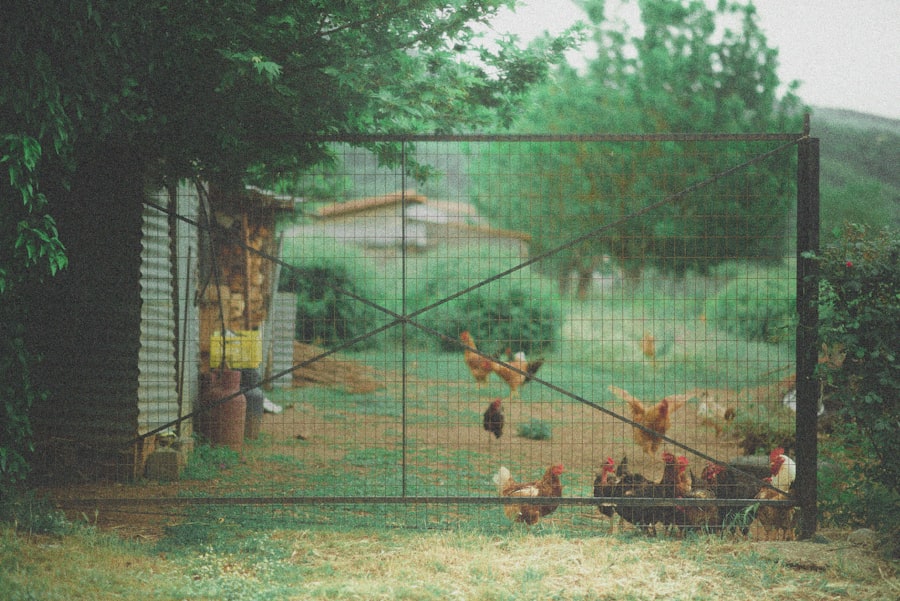Before keeping chickens in your community, it is essential to thoroughly research and understand the local laws and regulations governing poultry ownership. These may include zoning laws, animal control ordinances, and specific regulations related to chicken keeping. Requirements and restrictions can vary significantly between different communities, so it is crucial to familiarize yourself with the specific rules in your area.
In addition to legal considerations, it is important to be aware of potential concerns or objections that may arise from neighbors or local officials. Understanding both the legal landscape and potential challenges will help you better prepare for and address any issues that may occur as you pursue chicken keeping in your community.
Table of Contents
- 1 Building a strong case for keeping chickens
- 2 Seeking support from the community
- 3 Working with local authorities
- 4 Exploring legal options and resources
- 5 Educating others about the benefits of keeping chickens
- 5.1 Educating others about the benefits of keeping chickens is crucial for gaining support for your efforts. This involves sharing information about the positive impact of chicken-keeping on food security, sustainability, and community engagement.
- 5.2 Hands-on Experiences
- 5.3 Fostering Understanding and Appreciation
- 6 Being prepared for potential challenges and setbacks
- 7 FAQs
Key Takeaways
- Understanding the local laws and regulations is crucial before keeping chickens to avoid legal issues.
- Building a strong case for keeping chickens involves researching and presenting the benefits of chicken ownership.
- Seeking support from the community can help in gaining approval and addressing concerns about keeping chickens.
- Working with local authorities is important for obtaining necessary permits and addressing any objections.
- Exploring legal options and resources can provide guidance and support in navigating the legal aspects of keeping chickens.
Building a strong case for keeping chickens
Building a Strong Case for Keeping Chickens in Your Community
Understanding the Benefits of Chicken-Keeping
Once you have a clear understanding of the local laws and regulations, it is essential to gather information and evidence to support the benefits of keeping chickens. This includes their role in sustainable living, food security, and environmental stewardship.
Addressing Concerns and Objections
It is also crucial to address any potential concerns or objections that may arise, such as noise, odor, or sanitation issues. By being proactive and providing solutions to these concerns, you can build a stronger case for keeping chickens in your community.
Presenting a Compelling Case
In building your case, it can be helpful to gather testimonials and examples from other communities where chicken-keeping has been successfully integrated into residential areas. Additionally, providing information on best practices for chicken care and coop maintenance can help demonstrate your commitment to responsible ownership. By presenting a well-researched and compelling case for keeping chickens, you can increase the likelihood of gaining support from both your neighbors and local authorities.
Seeking support from the community

Seeking support from the community is an essential step in the process of keeping chickens in your area. This involves engaging with your neighbors and local residents to gauge their interest in and potential concerns about chicken-keeping. By opening up a dialogue and listening to their feedback, you can better understand their perspectives and address any issues they may have.
In seeking support from the community, it can be helpful to organize informational meetings or events to educate others about the benefits of keeping chickens and address any misconceptions or concerns. Additionally, creating a petition or gathering signatures from supportive neighbors can help demonstrate the level of interest and support for chicken-keeping in your area. By actively engaging with the community and seeking their input, you can build a strong foundation of support for your efforts.
Working with local authorities is a critical aspect of navigating the process of keeping chickens in your community. This involves reaching out to relevant officials, such as zoning board members, animal control officers, or city council members, to discuss your plans and address any questions or concerns they may have. By proactively engaging with local authorities, you can demonstrate your commitment to following the rules and being a responsible chicken owner.
In working with local authorities, it is important to be transparent and open to feedback, while also advocating for the benefits of chicken-keeping in a respectful and constructive manner. Building positive relationships with key decision-makers can help pave the way for a smoother approval process and increase the likelihood of gaining support for your efforts. By demonstrating a willingness to work collaboratively with local authorities, you can position yourself as a responsible and proactive member of the community.
Exploring legal options and resources
As you navigate the process of keeping chickens in your community, it is important to explore legal options and resources that may be available to support your efforts. This includes researching any existing legal frameworks or precedents related to chicken-keeping in residential areas, as well as seeking out legal guidance or support from organizations that specialize in animal welfare or sustainable living. In addition to legal options, it can be helpful to explore resources such as educational materials, sample ordinances, or case studies from other communities that have successfully integrated chicken-keeping into their neighborhoods.
By leveraging these resources, you can gain valuable insights and guidance to inform your approach and strengthen your case for keeping chickens in your area.
Educating others about the benefits of keeping chickens

Educating others about the benefits of keeping chickens is crucial for gaining support for your efforts. This involves sharing information about the positive impact of chicken-keeping on food security, sustainability, and community engagement.
The Benefits of Chicken-Keeping
By highlighting the benefits of fresh eggs, natural pest control, and organic fertilizer, you can help others understand the value that chickens can bring to a residential area.
Hands-on Experiences
In addition to sharing information, it can be helpful to provide hands-on experiences, such as hosting coop tours or workshops on chicken care and maintenance. By offering opportunities for others to learn more about chicken-keeping firsthand, you can dispel misconceptions and build enthusiasm for the idea within your community.
Fostering Understanding and Appreciation
By actively educating others about the benefits of keeping chickens, you can foster a greater understanding and appreciation for this sustainable practice.
Being prepared for potential challenges and setbacks
As you pursue the goal of keeping chickens in your community, it is important to be prepared for potential challenges and setbacks that may arise along the way. This includes being ready to address objections or concerns from neighbors or local officials, as well as navigating any legal or regulatory hurdles that may arise during the approval process. In being prepared for potential challenges, it can be helpful to develop contingency plans and alternative approaches to address any issues that may arise.
This may involve seeking out additional support from advocacy groups or legal experts, as well as being open to compromise or negotiation in order to find common ground with stakeholders. By anticipating potential challenges and setbacks, you can better position yourself to navigate the process with resilience and determination. In conclusion, navigating the process of keeping chickens in your community requires careful consideration of local laws and regulations, building a strong case for chicken-keeping, seeking support from the community, working collaboratively with local authorities, exploring legal options and resources, educating others about the benefits of chicken-keeping, and being prepared for potential challenges and setbacks.
By approaching this endeavor with diligence, patience, and a commitment to responsible ownership, you can increase the likelihood of successfully integrating chicken-keeping into your neighborhood while fostering a greater sense of sustainability and community engagement.
If you’re looking for tips on how to fight to keep illegal chickens, you may also be interested in learning about the best chicken coop interior ideas. Check out this article for some great inspiration on how to create a comfortable and functional living space for your feathered friends.
FAQs
What are illegal chickens?
Illegal chickens are chickens that are kept in areas where local ordinances or zoning laws prohibit the keeping of poultry.
Why are chickens sometimes considered illegal?
Chickens may be considered illegal in certain areas due to zoning laws, noise ordinances, health and safety concerns, or other local regulations.
How can I fight to keep illegal chickens?
To fight to keep illegal chickens, you can start by researching local ordinances and zoning laws to understand the specific regulations regarding poultry keeping in your area. You can also consider petitioning for a change in local regulations, seeking a variance or special permit, or working with local officials to find a compromise.
What are some common arguments for keeping chickens in urban or suburban areas?
Common arguments for keeping chickens in urban or suburban areas include their role in sustainable living, providing fresh eggs, teaching children about responsibility and animal care, and their potential to reduce food waste through composting.
What are some potential challenges in fighting to keep illegal chickens?
Some potential challenges in fighting to keep illegal chickens may include opposition from neighbors, navigating complex local regulations, and the need to address concerns about noise, odors, and potential health and safety issues.

Meet Walter, the feathered-friend fanatic of Florida! Nestled in the sunshine state, Walter struts through life with his feathered companions, clucking his way to happiness. With a coop that’s fancier than a five-star hotel, he’s the Don Juan of the chicken world. When he’s not teaching his hens to do the cha-cha, you’ll find him in a heated debate with his prized rooster, Sir Clucks-a-Lot. Walter’s poultry passion is no yolk; he’s the sunny-side-up guy you never knew you needed in your flock of friends!


The Benefits of Chicken-Keeping
By highlighting the benefits of fresh eggs, natural pest control, and organic fertilizer, you can help others understand the value that chickens can bring to a residential area.
Hands-on Experiences
In addition to sharing information, it can be helpful to provide hands-on experiences, such as hosting coop tours or workshops on chicken care and maintenance. By offering opportunities for others to learn more about chicken-keeping firsthand, you can dispel misconceptions and build enthusiasm for the idea within your community.
Fostering Understanding and Appreciation
By actively educating others about the benefits of keeping chickens, you can foster a greater understanding and appreciation for this sustainable practice.
Being prepared for potential challenges and setbacks
As you pursue the goal of keeping chickens in your community, it is important to be prepared for potential challenges and setbacks that may arise along the way. This includes being ready to address objections or concerns from neighbors or local officials, as well as navigating any legal or regulatory hurdles that may arise during the approval process. In being prepared for potential challenges, it can be helpful to develop contingency plans and alternative approaches to address any issues that may arise.
This may involve seeking out additional support from advocacy groups or legal experts, as well as being open to compromise or negotiation in order to find common ground with stakeholders. By anticipating potential challenges and setbacks, you can better position yourself to navigate the process with resilience and determination. In conclusion, navigating the process of keeping chickens in your community requires careful consideration of local laws and regulations, building a strong case for chicken-keeping, seeking support from the community, working collaboratively with local authorities, exploring legal options and resources, educating others about the benefits of chicken-keeping, and being prepared for potential challenges and setbacks.
By approaching this endeavor with diligence, patience, and a commitment to responsible ownership, you can increase the likelihood of successfully integrating chicken-keeping into your neighborhood while fostering a greater sense of sustainability and community engagement.
If you’re looking for tips on how to fight to keep illegal chickens, you may also be interested in learning about the best chicken coop interior ideas. Check out this article for some great inspiration on how to create a comfortable and functional living space for your feathered friends.
FAQs
What are illegal chickens?
Illegal chickens are chickens that are kept in areas where local ordinances or zoning laws prohibit the keeping of poultry.
Why are chickens sometimes considered illegal?
Chickens may be considered illegal in certain areas due to zoning laws, noise ordinances, health and safety concerns, or other local regulations.
How can I fight to keep illegal chickens?
To fight to keep illegal chickens, you can start by researching local ordinances and zoning laws to understand the specific regulations regarding poultry keeping in your area. You can also consider petitioning for a change in local regulations, seeking a variance or special permit, or working with local officials to find a compromise.
What are some common arguments for keeping chickens in urban or suburban areas?
Common arguments for keeping chickens in urban or suburban areas include their role in sustainable living, providing fresh eggs, teaching children about responsibility and animal care, and their potential to reduce food waste through composting.
What are some potential challenges in fighting to keep illegal chickens?
Some potential challenges in fighting to keep illegal chickens may include opposition from neighbors, navigating complex local regulations, and the need to address concerns about noise, odors, and potential health and safety issues.
Meet Walter, the feathered-friend fanatic of Florida! Nestled in the sunshine state, Walter struts through life with his feathered companions, clucking his way to happiness. With a coop that’s fancier than a five-star hotel, he’s the Don Juan of the chicken world. When he’s not teaching his hens to do the cha-cha, you’ll find him in a heated debate with his prized rooster, Sir Clucks-a-Lot. Walter’s poultry passion is no yolk; he’s the sunny-side-up guy you never knew you needed in your flock of friends!







